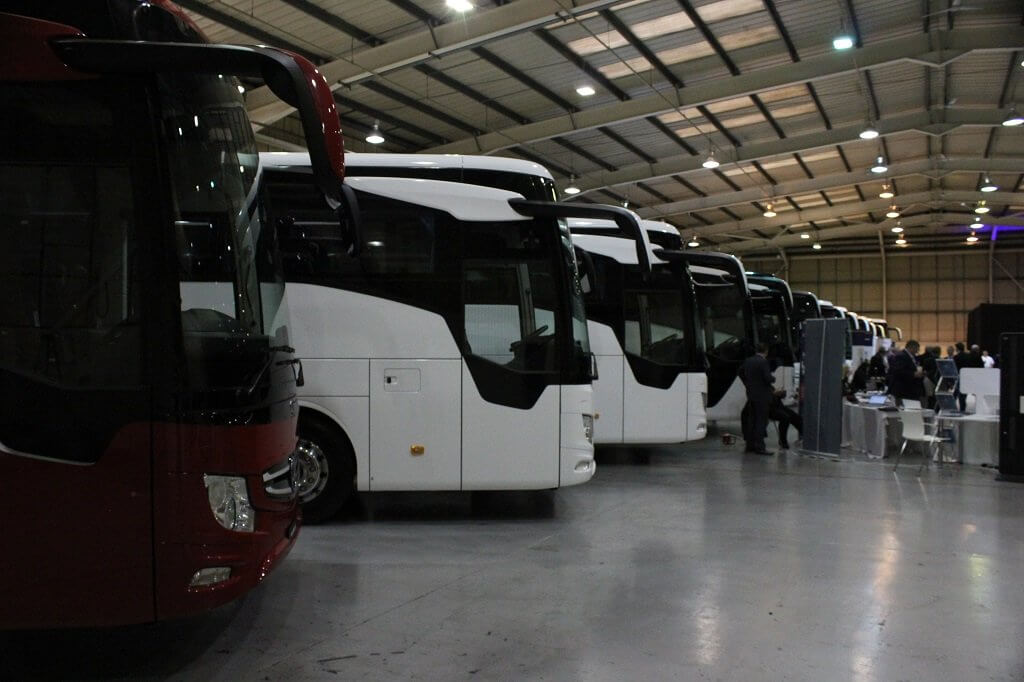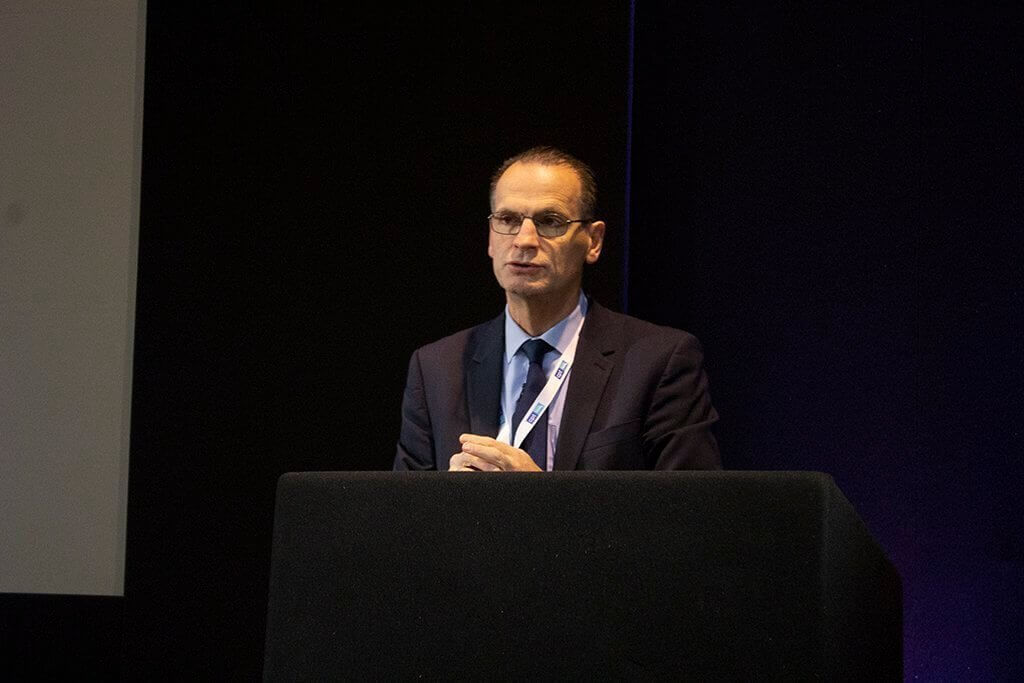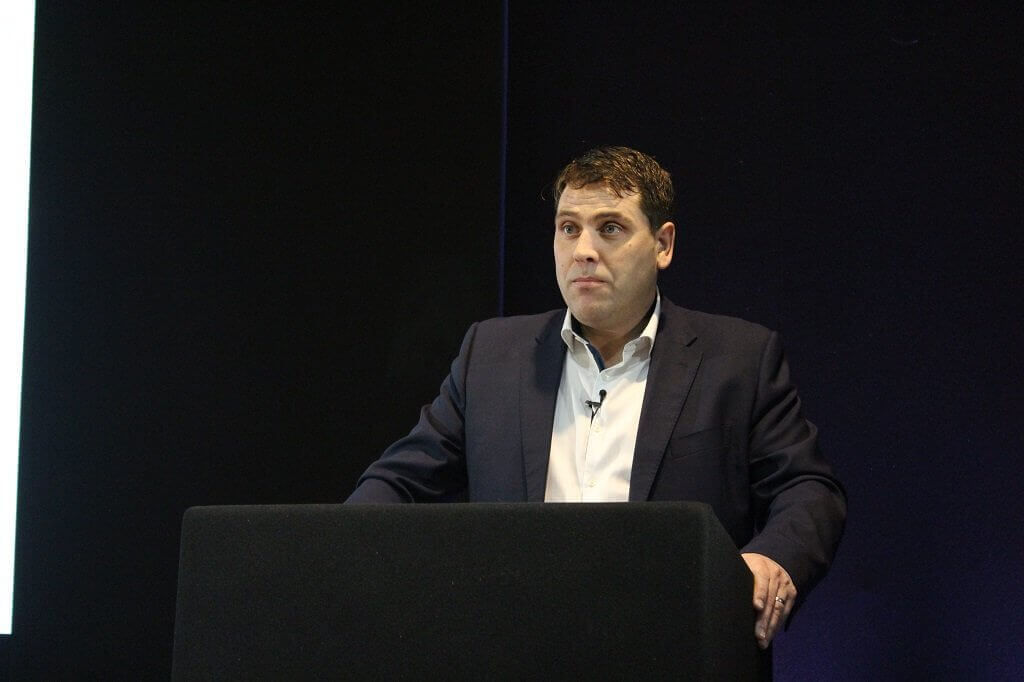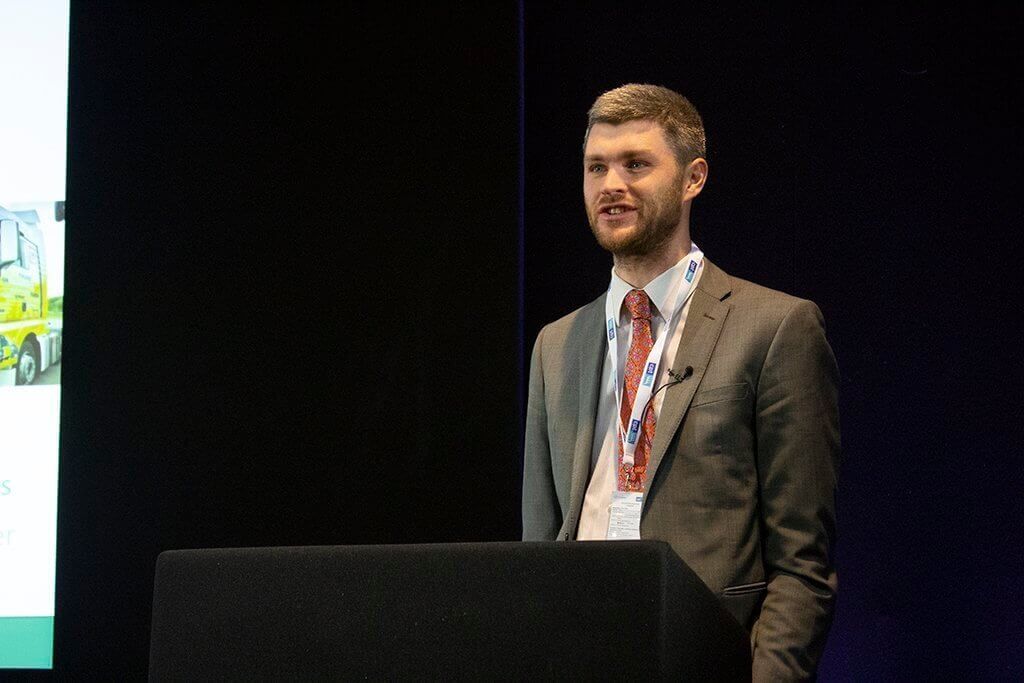Speakers from a variety of backgrounds gave presentations at this year’s CPT Coaching Conference to help prepare coach operators for what lies ahead. James Day reports
Hosted by EvoBus UK in Coventry, the CPT held its 2018 Coaching Conference on 6 December.

The event was titled ‘Tomorrow’s World,’ and focused on the future of the coach industry from technological, regulatory and environmental standpoints. [wlm_nonmember][…]
By subscribing you will benefit from:
- Operator & Supplier Profiles
- Face-to-Face Interviews
- Lastest News
- Test Drives and Reviews
- Legal Updates
- Route Focus
- Industry Insider Opinions
- Passenger Perspective
- Vehicle Launches
- and much more!
The event was opened and compered by John Johnson, Chair of the CPT Coach Commission and Director of Johnsons Coach & Bus of Henley in Arden.
He began: “As I stand here, I am optimistic for the future, and see a good year ahead. Yes there is a huge amount of unsettlement out there, but our industry is resilient. We can stand the change – we just deal with it and move on.
“Our job is about moving customers from A to B in comfort, in a reliable vehicle with good service. A coach hasn’t changed that much in 40 years. The biggest differences are the engines, which are much more environmentally friendly, and technology. It is moving at such a fantastically high rate that it can be a difficult job for us dinosaurs to keep up with what is going on.
“The industry is attracting younger customers. At Johnsons we work for people like Snap and Zeelo, and our drivers are getting used pick-up points being provided by apps. There will be huge change in the future, but our business is about practical application. In the end, our customers will only travel with us if the service is good.”

Get noticed
Martin Dean, CPT President and Managing Director of Bus Development at Go-Ahead Group was the first speaker of the day. He made some jokes about being a bus man at a coach conference, though he did highlight Go-Ahead’s coach operations and the recent acquisition of East Yorkshire Motor Services (EYMS).
He began: “Coaches are the unsung heroes of the transport world. You have a very broad offer from continental tours to school services, and all of us here know the value of coach travel to local economies, the environment and passengers.
“The coach sector tends to go about its business in a quiet way, which is both a strength and a weakness. Bus is more of a controversial sector – when privatised it was viewed by many as a utility sector like electricity or water,which many thought should have stayed in public control like rail. Around 40% of income for bus operators comes from the public sector, through concessionary fares, BSOG and payments for socially necessary services.
“By contrast, coach operators tend to get forgotten. There is funding available for bus in a way it is not for coach for retrofitting. A challenge for the coaching sector is to try and get the politicians interested, though not too interested.
“We need to give the full-time officials at CPT all the ammunition they need to make their arguments to help the sector to make a way forward. It’s good to hear that some progress is being made to find exemptions in Clean Air Zones (CAZ).
“There are a lot of challenges, but the industry has got a great future. From what I’ve heard from people here, at worst people said they had an average year and a lot of people said they had a good year. You as a sector have always managed to adapt to what has been thrown at you.”
CASE in the future
The talk from Michael Thielmann, CEO of EvoBus UK, really embraced the conference theme of Tomorrow’s World as it focused on CASE – Connected, Autonomous, Shared / Service and Electric vehicles.
Michael noted than many of the future innovations coming to coaches and buses begin in the car industry, and he therefore showed a video Daimler has produced on CASE developments in its car range. Some standout examples were connected vehicles able to share traffic information and the availability of parking spaces with each other, vehicles which park themselves and return to the driver on command, and some details on the company’s growing partnership with on-demand service provider Via. The video also noted that Mercedes-Benz is convinced the future is electric, as opposed to any other alternative fuel or drive.
A trial of an autonomous Citaro service bus in Amsterdam was mentioned, where autonomous lane keeping was demonstrated and the technology proven in situation where traffic is predictable.
“Urban operation is still quite unpredictable and there is no easy solution we can work on,” Michael said. “Our focus is currently on technology which supports the driver, rather than takes over from the driver.”

Michael noted that in some respects, autonomous coaches could be easier to achieve, with the bulk of their service taking place on motorways and other major roads with circumstances which are easier to predict. However an entirely driverless coach is unlikely, as a driver would likely need to take over when the coach reached a more unpredictable urban environment at the end of its journey. The technology is likely to reach express coach services first, such as those provided by National Express.
Michael also stated that a fourth generation of active brake assist is being developed. It scans up to 250m ahead of the coach for obstacles, along with a secondary system scans a 120 degree angle to detect cross traffic.
“These systems are not automatic entirely, but the driver gets an audio warning and if there is no reaction, the vehicle will start braking,” Michael explained. “If the driver does react, the coach will respond to the inputs.”
Electric challenges
Also speaking from EvoBus was Ian Wallace, the company’s Senior Sales Manager, who gave a presentation specifically geared towards electric vehicles.
“Making the switch from diesel to electric today is an extreme challenge,” he explained.
“Electric vehicles have a shorter range, standardisation of the charging point is still open and there is a large financial impact for cities and operators.”
“The first challenge is that a diesel tanks carries a lot more energy than an electric bus, as batteries have a much lower energy density than fuel. The second challenge is heating and cooling the vehicle. In the winter months, up to 50% of the energy used by the vehicle is spent on heating, compounded on buses by the fact the door is frequently opened, while air-conditioning can require 25% of the energy in summer. The trick is to get as much energy as possible to the wheels.
“Converting a diesel garage to an electric one is the third challenge. An electric bus requires the same power as 75 households, and charging takes much longer than refuelling.
“The fourth challenge is the workshop equipment. New equipment is often required to access batteries mounted on the roof of vehicles, and new training on high voltage equipment is required for technicians.”
Ian said Mercedes-Benz has a two-pillar strategy for city buses. It offers a hybrid Euro VI drives today which are highly competitive on a total cost of ownership basis, and said the company will continue to develop its electric offering over the next five years.

Infrastructure investment
On the topic of transport infrastructure, Greg McClymont – Cities Transport Lead at the National Infrastructure Commission (NIC) addressed the conference. The organisation was set up in 2015 and this year it published the National Infrastructure Assessment, which provides impartial long-term advice on national infrastructure policy for the next 30 years. All of its spending recommendations fit within 1.2% of GDP per year.
“Growth in population and employment is faster in cities and that is likely to continue into the future,” said Greg. “That means passengers are increasingly going to want to be picked up and dropped off in cities.
“Large towns and cities tend to be the worst in terms of congestion on infrastructure networks, though they are not the only places where it exists. A lot of the current policies the government has, such as HS2, focus on transport between cities, but the Government doesn’t have so much in the pipeline the improve transport within cities.
“Cities will need to look at ways to promote people travelling by coach or bus.”
Greg said that the NIC estimates that in the future there will be £43bn of extra investment into cities on top of what they are used to receiving.
Low carbon progress
Daniel Hayes, Project Manager Bus Working Group at Low Carbon Vehicle Partnership, began by stating that his organisation would seek to establish a coach working group to help the coach sector influence government policy and gain access to some of the retrofit funding currently available to bus operators (or a seperate, new fund specific to coach operators).
“We help the DfT write policy that will help accelerate the shift to low carbon road transport,” Daniel explained.
Daniel showed an image of a Nottingham city centre car park, which was marked for demolition. However, this is to make way for a new city centre car park.
“Cars are still being encouraged into the city centre,” Daniel said. “Do we still want that?”
“There are a few places where people are thinking about coaches,” Daniel noted, displaying an image of a new coach park which is planned in Wembley.
Daniel highlighted that transport is now the largest contributor to greenhouse gases and it is one of the only sectors which has a growing environmental footprint.
“We must start including private cars in CAZ rules, so people recognise they are part of this problem,” Daniel stated. “We would like to see all CAZ become Class D at some point – targeting all vehicles, as Birmingham is doing.

At the moment, the likes of the coach and bus sector are getting clobbered, when it’s cars and vans that are the real problem.”
Daniel noted that £220m has been provided to local authorities to help local businesses adapt to CAZ regulations. He recommended that operators ask if they can get support.
The MaaS model
The headline sponsor of the event was CoachHire.com, and the company’s CEO, Matthew Hassell, was the first speaker after a brief coffee break.
The company was founded in 2011, and more recently was backed by a £3.75m investment from Sir Brian Souter. Today, it is responsible for 1.5m passenger journeys per annum, and manages 150 home to school routes.
“We very much see ourselves as being in the Mobility as a Service (MaaS) sector,” said Matthew. “There are a plethora of platforms operating in that sector and it is the future of the industry.
“There are various solutions for various elements of the market, all about the future of the car. But from 2030 onwards, we could see modal shift away from the car. This is why many car manufacturers are investing in on-demand transport platforms. They are hedging their bets, and taking stakes in virtually all MaaS businesses. One of the biggest investors in Uber is Toyota, for example.”
Matthew touched on the taxi market during his presentation. He noted that there were three huge black cab operators in London in 2010, but they ‘buried their heads in the sand’ and didn’t see MaaS coming, or didn’t want to.
“They got wiped out, and had to merge to survive,” said Matthew.
He questioned whether something similar could happen to coach operators, and encouraged them to grasp the opportunity.
He highlighted three major benefits of working with a MaaS platform. One was efficiency benefits and soft-cost savings.
“I’ve had operators say to me that they don’t need a sales department anymore, because we’re bringing them customers,” Matthew enthused.
“We also have ideas to drive up driver engagements via training and development, and there is the obvious benefit of customers the operator otherwise wouldn’t have.”

The voice of the regulator
The keynote address was delivered by Senior Traffic Commissioner Richard Turfitt. He joked that it had drawn laughs from the other traffic commissioners when he announced he was attending a conference called ‘Tomorrow’s World,’ as he is not particularly technologically minded, but did say that he felt electronic systems make good business sense.
Despite this, he noted that while technology always promises to make life easier, it does tend to throw up unforeseen challenges.
“We recently started publishing our quarterly application times,” said Richard. “They were down to seven weeks, but the application times are slipping again.
“Technology does make us transparent, and also makes the information more immediate, so we’ve taken steps to address that. Individual commissioners are now able to hold the central licencing office to account. This is a good thing, but it is putting more pressure on the central licencing office in the wake of a DVSA recruitment freeze.”
Richard highlighted that the new online system allows operators to partially complete an application and return to it later. This has had the unintended consequence of the Office of the Traffic Commissioners once again having to deal with incomplete applications.
Another potential unintended consequence of electronic records is that they may no longer be viewed by some operators. “Some operators are not acquainted to reading from screens,” Richard noted. “Technology needs to be used in the same way as pen and paper – it needs to be regularly checked and audited.”
On the subject of leaving the EU, Richard said that the change may present some opportunities for coach operators and it was important that the industry regulators do not hold operators back.
“What we do know is there is going to be little change to things like Driver CPC,” Richard said. “It was nice to see CBW last week run an article called ‘Turning a chore into a benefit.’ (see CBW1371). I think that is the approach – take each piece of legislation and use it your best interests.
“As for borders and traffic management, I’ve got no news for you – I don’t know. Most of that will depend on the political settlement. We’ve been communicating with the DfT while also trying not to get in the way. We will be moving quickly and communicating with you once we get a bit more detail.

“Concepts such as good repute have been around for ages and are part of GB law – they don’t just come from EU legislation. In fact, I think it was us who took it to the EU. There will be that continuity, and any change will be incremental.”
During question time afterwards, financial standing was raised as an issue, with a substantial amount of money being kept aside when it ‘could be invested elsewhere.’
“I agree,” Richard responded. “This is why back in 2011 I put something in the statutory documents which allows operators to rely on annual accounts.
“If you are corporate entity, you are going to be submitting your annual accounts anyway and they can be electronically transferred to us and we have relaxed the rules on original documentation. Not many operators have picked up on this.
“The problem is the certification – you do have to pay an auditor, but you pay for that to cut down on the inconvenience. I can publicise it a bit more, but I have to admit I’ve slightly given up the ghost. We trialled it and publicised it at the time, but it hasn’t been used.”
A security wake-up call
UK Government security advisors provided an extensive talk on security and how companies can combat espionage, terror threats and cyber attacks against their businesses.
The session illustrated the range of security threats facing UK companies and detailed some of the security-minded initiatives that can be employed to address the risks and protect companies, staff and customers.
Because the identities of the people who gave the presentation are secret, and it included information which the advisors do not wish to be seen by ‘hostiles,’ CBW has been asked not to report on the session. However, having attended an equally compelling and useful session with Backhouse Jones previously (published back in CBW1294) I would highly recommend any operator who has the opportunity to attend such a session, does so.
To seek advice and expertise on this topic, visit www.cpni.gov.uk.

An emotional passenger experience
The final talk of the day was a brief talk by Steven Salmon, Director of Policy Development at CPT, utilising a presentation about the Dutch rail industry.
The appearance discussed how the presentation of a vehicle could influence passenger perceptions on many different aspects of the service – even those with no connection to the look of a vehicle at all – by subconsciously influencing their overall opinion.
“People are not getting on your coaches with a mental checklist, but are nonetheless experiencing emotions that will affect their inclination to come back in the future,” said Steven.
The rail operator changed the presentation of different train carriages and carried out a passenger survey on all aspects of the service. The results showed the improved environment resulted in increased passenger satisfaction on topics like timetables and staff, despite no changes being made.
Perhaps most interesting was a trial with Merseyrail in the UK, where a train was painted in a yellow livery on one side and a grey livery on the other. Certain passengers were picked up with the yellow side showing, and others with the grey side showing, depending on which side of the platform the train arrived at.
There was a clear difference between the surveyed passengers who had ‘boarded the yellow train’ than those who had ‘boarded the grey train,’ with the ‘yellow train’ performing better. Steven said: “This is proof that people do look at colour and so on when considering whether they have had a good experience. It’s not all about what people consciously think about, but the whole experience.”
[/wlm_ismember]

